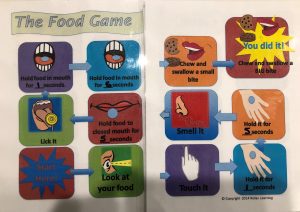Food refusal is a common concern with young children. Children with autism or other developmental disorders tend to eat an extremely narrow range of foods. What is it about autism that often makes children resistant to eating a normal and varied diet? We know many children with autism spectrum disorder have sensory issues, are overly sensitive to certain textures, sounds and perhaps tastes.
Many children also will have an insistence on sameness, are comfortable with routines and have difficulty with transitions, and show negative behaviors when those routines aren’t upheld. Those traits often make children insist on eating only a very limited combination of foods. Here is a Food Game that is easy to implement and to get them to become more familiar with the food.
If you want to read more on this topic, Autism Speaks has a great article on Food Refusal. https://www.autismspeaks.org/blog/2015/07/02/parent-preschooler-autism-seeks-help-wild-swings-eating


